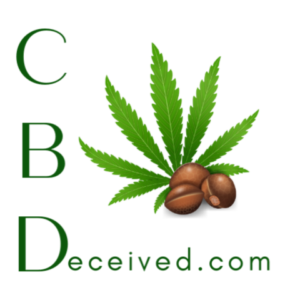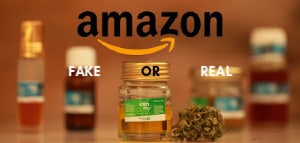When it comes to CBD these days, it’s hard not to get caught up in the hype. With each passing day it seems like there’s a new use for CBD, with evidence mounting that it helps with everything from depression and anxiety to seizures and chronic pain. But along with all this hype and hope, CBD is attracting something far less appealing: scammers.
When it comes to CBD these days, it’s hard not to get caught up in the hype. With each passing day it seems like there’s a new use for CBD, with evidence mounting that it helps with everything from depression and anxiety to seizures and chronic pain. But along with all this hype and hope, CBD is attracting something far less appealing: scammers.
Like any ‘miracle’ product that can sell for a pretty penny, CBD has attracted a slew of unsavoury characters who look to scam the hopeful masses out of their hard earned dollars; and when it comes to this, their playground is Amazon.
So let’s take a look at this juggernaut of a marketplace to better understand the facts when it comes to CBD.
First off, Amazon outright bans the sale of CBD products on its site, but what it doesn’t ban is the keywords ‘cbd’ or ‘cbd oil’. This means not only can you search for CBD products on the site, but you’ll get an array of results tagged with those keywords. The catch? None of them are likely going to be genuine CBD products.
Amazon categorizes CBD as a Schedule I Controlled Substance since it is extracted from hemp, a sub-strain of cannabis sativa. Amazon banning CBD products is simply their way of abiding by federal regulations. Where all those ‘cbd oil’ products on Amazon come from stems from the fact that industrial hemp is broadly legal in many states, and CBD derived from these crops is legal to produce and sell in those specific states. So while they’re in some nuance between Federal/State regulations on CBD, the takeaway is that selling CBD oil on Amazon is not allowed: they’re a global company, and they don’t deal with the legality of a product on a state-to-state basis. There are plenty of sites that claim there are ‘loopholes’ to this (It’s in a small brown bottle! It has a medical dropper! It’s THC-free!) but the fact is that the commerce giant explicitly states in their outline of restricted products that CBD cannot legitimately be sold on their platform. Full stop.
So when you search ‘CBD oil’ on Amazon and get an onslaught of seemingly legitimate search results, what are you actually seeing?
Almost all the ‘CBD’ products listed on Amazon are actually hemp oil/hemp seed oil and/or some mixture of a hemp product diluted in another oil. Though both hemp and cannabis plants can be used to produce CBD extract, and are extremely similar in appearance, they are very far apart in terms of composition of therapeutic elements such as THC and CBD. Disreputable sellers use this to their advantage, plastering their product with logos featuring hemp leaves (indistinguishable from marijuana leaves) and touting the benefits of the oil (hemp oil is fantastic for skin ailments, but taken internally is more a dietary supplement than anything). Simply put, CBD has all the medicinal and therapeutic benefits you are looking for, and even though you can extract that from using the full hemp plant – stalk, stems, flowers and all – the products on Amazon are created in a way that results in a product with little to no CBD at all. Sure, hemp oil contains a health benefits such as being high in omega 3 and 6 fatty acids, but aside from that, there is not nearly as many benefits as the actual cannabinoid compound CBD. The label may say it contains ‘X milligrams’, but a closer look reveals those are mg’s of amino acids and vitamins, not CBD.
Much of the essential confusion that scammers leverage comes from the fact that high-quality CBD products can come from the hemp plant. This ambiguity leads to products being sold as ‘CBD oil’ when they’re in fact, simply “hemp oil.” Hemp oil and CBD oil are both derived from hemp plants, but they are extracted from separate parts of the crop and have different chemical compositions. Hemp seed oil contains no cannabidiol (CBD), and it’s made by cold pressing hemp seeds only. When CBD oil is created, beneficial cannabinoids and terpenes are extracted from the entire plant. When you read about all the health benefits of the ‘CBD oils’ on Amazon, many are simply tied to the known aspects of hemp seed oil as a dietary supplement. Yes, hemp seed oil is positively loaded with heart-healthy acids and vitamins, but that’s a far cry from the way CBD oil works in tandem with your body’s endocannabinoid system to produce a myriad of benefits we’re only beginning to scratch the surface of.
We know this can seem confusing, and for scammers that’s entirely the point. In the world of Amazon a common industry claim of a ‘No THC CBD Oil’ obscures the fact that not only does the product not contain intoxicating THC, but it also contains no CBD. These kinds of linguistic semantics just show how far sellers will go when trying to create the illusion of a legitimate CBD product. In fact, this emerging market is so rife with misinformation that even ‘authoritative’ CBD education sites mistakenly claim that hemp-derived CBD can be bought on Amazon. If the ‘experts’ can’t get this simple fact right, how can the consumer be expected to?
The fact of the matter is that when it comes to CBD products, you get what you pay for, and the world of ‘deals’ on Amazon should always raise alarm bells. Proper extraction methods from high-quality, CBD-rich organic matter that yields a lab-tested and useful medicinal product costs money. When a company has invested in creating a quality product, they will take the time and effort to explicitly and clearly state exactly what you’re getting. If you’re looking at a product and you’re not entirely sure exactly how much CBD it contains, then it’s likely that it contains none. When it comes down to it, any CBD product of quality will have both a total mg content and a mg per ml listing for dosage purposes. There are no shortcuts, and since you’ll be consuming this product internally for the benefit of your health, the potential savings are seldom worth the potential risks of taking an untested product purchased from a marketplace that doesn’t even support its sale.
So the ultimate takeaway here is that if you’re looking for the real thing – for a legitimate CBD product – then Amazon is not the marketplace for you. No amount of money saved, or the convenience of a familiar shopping experience can reimburse you when you receive a substandard product masquerading as CBD.

